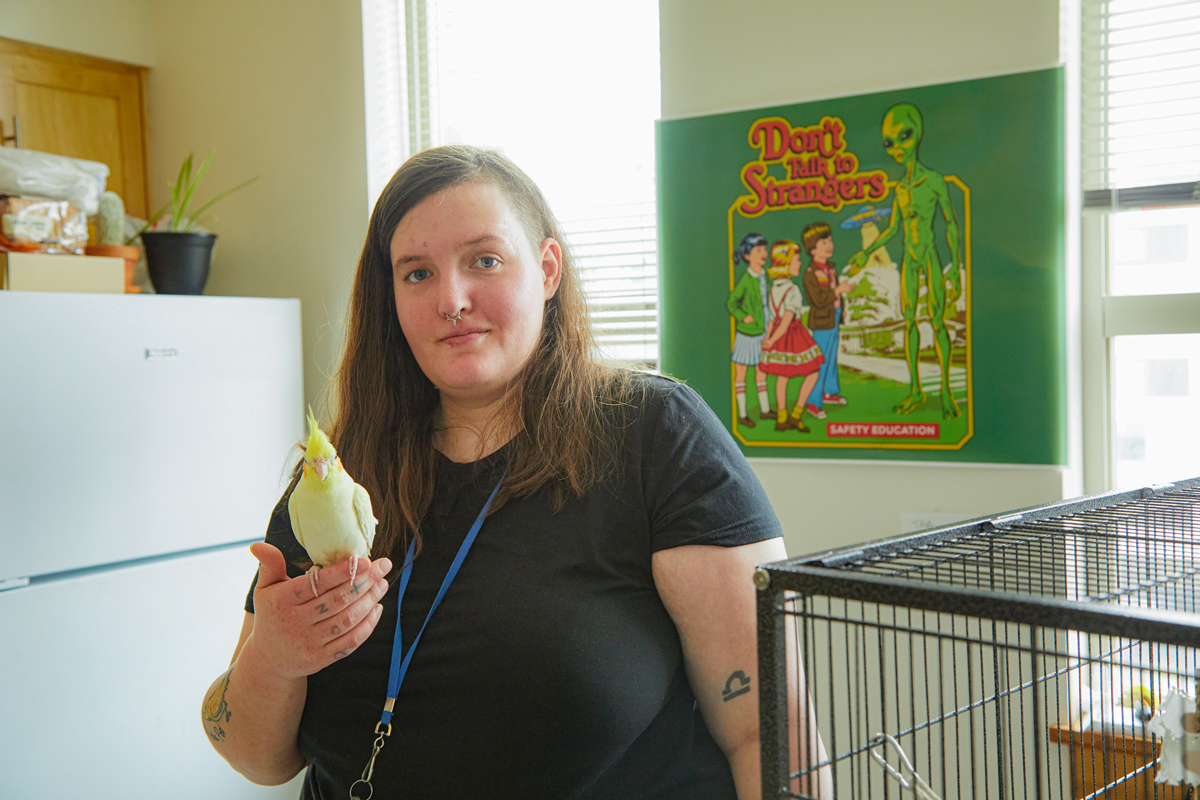Each Plymouth resident has a unique personal history, but they also have a lot in common. For starters, 95% have a disability. Many are grappling with multiple forms of trauma. All of Plymouth’s more than 1,100 residents are also resilient members of our community who—with a home and the support they need—can thrive. Take August, for example.
At 26, August is much younger than many Plymouth residents, who are mostly seniors. However, managing a disability is part of her daily life. Plymouth Housing has not only provided her with the health support she needs to alleviate her epilepsy, but has also given her the sober-living environment she desires to keep her wellness in balance.
August has lived in the Pat Williams Apartments since summer 2022. Out of Plymouth’s 17 buildings, Pat Williams is the one place focused on supporting people with substance-use disorder. There is no one-size-fits-all approach to solving homelessness, which is why Plymouth provides individual support for each resident.
After experiencing homelessness and meth addiction in her teens and early 20s, she now describes life as “stable.” Her implanted nerve stimulator and new medicines help control seizures. Her severely weakened shoulder—often dislocated during falls and convulsions—is healing after two surgeries. Her “bestie” Pika, a bright yellow cockatiel, brightens her days. Luckily, Plymouth case manager Jaclyn is happy to “bird-sit” Pika when August uses household chemicals to clean her apartment.

Plymouth resident August with her cockatiel, Pika.
Sitting in her home now, a bright corner unit dominated by Pika’s “cockatiel playground,” August reflects on being seizure-free for 9 months—a new record. It’s remarkable what can happen when one feels at peace where they live.
“When I was on drugs and living chaotically, I didn’t realize how severe my epilepsy was. Now I see, compared to most other people, my condition was quite extreme,” she says.
Growing up in a small town, August’s inherited epilepsy got so bad that she had to wear a helmet. She felt depressed. Plus, her mom was drinking. When she moved to Seattle to be with her father, he hadn’t told her that the two of them would be homeless. Before long, she made friends and got into the drug scene where she used meth for seven years.
Initially, living outside felt freeing. For one, she discovered that many people discarded perfectly usable or valuable items. Once, she found that someone had thrown away vintage postage stamps from Czechoslovakia and post-war Germany, plus memorabilia from East and West Berlin.
But this lifestyle also left much to be desired. People who were housed often looked at her differently—almost like she wasn’t even a human being. Once, August was starting to have a seizure and a young man who was walking nearby instinctively reached out to support her convulsing body. He began to cry with August in his arms, clearly overwhelmed and unsure of what to do. Meanwhile, someone came out of their apartment and threatened to call 911 if August didn’t leave.
On top of that, there were only so many cycles of buying, selling, and using drugs that she physically and emotionally could take. In the beginning, she had energy for the adventure. But eventually, she discovered it wasn’t an adventure at all. One day, she had an epiphany that her life would be easier if she stopped using drugs. In that moment, she did not need help coming to sobriety—she needed safe, stable housing to maintain it. So when a case manager approached her, she was ready to move into a shelter immediately. She later made the choice to move into her home at Plymouth Housing.
Today, with her basic needs taken care of, August has different priorities. She’s able to plan for the future rather than worry about basic needs to get through the day. Currently a 4.0 student at Seattle Central College, she’s taking classes in social and human services—plus doing Robotics club for fun. Outside of school, she’s busy with a new job. As a caregiver for seniors and people with disabilities, she’s considering becoming a case manager and continuing to remain in this field.
“I start training to be a licensed caregiver on Wednesday. I’m super excited.”